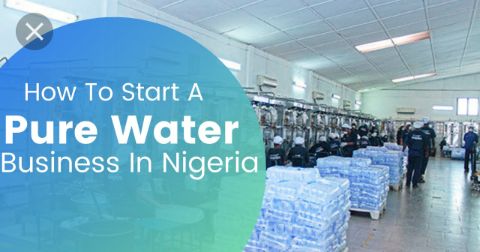The sale of pure water is popular in Nigeria. Pure water is the only available resource to quench thirst due to the growing population, the government’s inability to supply clean, affordable drinking water, and possibly the public’s fear regarding the amount of sugar in soft drinks, Entrepreneurng report.
The vast majority of the populace of the teams consumes pure water. The vast majority of people drink pure water, including you and me. This is the reason why, besides information technology, it is a growing and successful industry in Nigeria. There is a market in every town and city, so it doesn’t matter where you are to start a business selling purified water.
Step By Step Guide:
1. Write a Business plan
Since the market is active and growing, a comprehensive feasibility study and report are not necessary. A business plan is necessary to help determine from the start how the project will be financed and how much money will be required. At this point, a business plan is essential because it specifies the amount and source of funding needed. Depending on the category you choose to invest in, the level of pure water business can range from using a two-bedroom apartment to blocks of apartments.
2. Register the company with NAFDAC and CAC
Every business entity, including sole proprietorships and limited liability companies, must register with the CAC to be held accountable. In a similar vein, every company that sells food, drugs, or consumables must register with a government regulator.
Additionally, each business needs to register with the appropriate tax authority (Federal Inland Revenue or the State Internal Revenue). If NAFDAC registration proves to be challenging, and time-consuming, or you want to operate on a relatively small scale and do not want to go through NAFDAC protocol, you can also obtain a license from another well-established pure water company in a different region of the country.
3. Locate a plant site
You must either lease a suitable accommodation, with access to the market, or put up a suitable accommodation. Access to the market and acquisition costs might need to be balanced. The main factor is a success. However, additional infrastructure must be set up, including factory security, power, an access road, etc
4. Dig a borehole and put tanks up above it
This guarantees a steady water supply. From #400,000 to #800,000 may be required to sink a borehole.
Depending on the startup capacity of the business, you could install a full-scale distillation system or a UV sterilization process. The price of purchasing distillation equipment could reach millions of Naira. Since the actual cost will be part of the expenses listed in the business plan, it cannot be predicted with certainty and needs to be researched.
5. Get the necessary equipment
According to the size of the daily production that is anticipated, an automatic sealing machine must be in place. Before starting the project, the cost must also be confirmed.
The company’s name and the brand name of the pure water must be printed on rolls of appropriate nylon material. The number of rolls purchased should match the enterprise’s capacity.
To power the operations, a generator set also needs to be installed. There are various manufacturers and generator capacities, and it all depends on the capability of the business as well as the start-up funding and many others.
6. Employ workers
Hire workers such as machine operators, packagers, cleaners, drivers, one salesperson, one security guard, and a supervisor. This will guarantee that the relevant positions are adequately staffed.
7. Market it
Make contact right away with merchants who will sell the water. Always check a person’s creditworthiness before extending credit; otherwise, they might fire you from the company.
For the truck to be profitable, it must be able to transport sufficient quantities of reasonable-sized bags of pure water for distribution to numerous customers.
Conclusion
Starting a pure water business in Nigeria can be very profitable, but it also takes passion, perseverance, and some cash. In Nigeria, you only need a start-up capital of about three million nairas to launch a pure water business.
The size of the organization determines the scope of operations, the investment in money, human capital, and equipment. This is only a step to take toward success.


